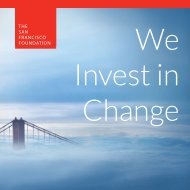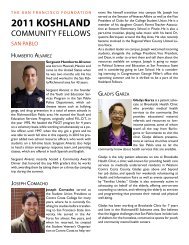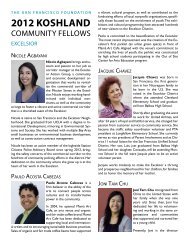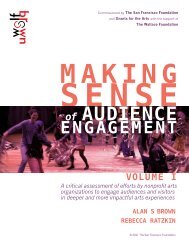2008 Koshland Connect - The San Francisco Foundation
2008 Koshland Connect - The San Francisco Foundation
2008 Koshland Connect - The San Francisco Foundation
Create successful ePaper yourself
Turn your PDF publications into a flip-book with our unique Google optimized e-Paper software.
In Conversation<br />
with Bob Friedman<br />
Recently <strong>Koshland</strong> Program Director Retha Robinson sat<br />
down with <strong>Koshland</strong> Committee Member Bob Friedman<br />
to discuss his family, philanthropy, and the direction of<br />
the <strong>Koshland</strong> Program.<br />
Greetings, Bob. Thanks for taking the time to have this conversation.<br />
It’s great to have our Committee members open up<br />
before the public in forums like this newsletter. I’d like to start<br />
by asking you to give us a brief rundown on your background.<br />
First of all, Retha, it’s a pleasure to have this conversation. I am a<br />
fourth generation native of the Bay Area. After growing up here I<br />
heeded the call to go east for university. I spent the next 20 years<br />
on the east coast, completing my undergraduate degree before<br />
continuing on to law school. After graduating I was fortunate<br />
to work with Jimmy Carter, when he was governor of Georgia,<br />
on environmental issues. <strong>The</strong>n I began my economic development<br />
work and founded the nonprofit Corporation for Enterprise<br />
Development to open up pathways to the mainstream economy<br />
for low-income, and often marginalized, communities.<br />
For readers who aren’t aware, Dan <strong>Koshland</strong>, one of the founders<br />
of <strong>The</strong> <strong>San</strong> <strong>Francisco</strong> <strong>Foundation</strong> and the inspiration for and<br />
namesake of the <strong>Koshland</strong> Program, was your grandfather. So I<br />
see this entrepreneurial spirit of philanthropy runs in the family.<br />
Any philanthropic values I have really begin with my grandfather’s<br />
example, and then were sustained through the influence<br />
of my parents. My grandfather was a tremendous person – he<br />
often described himself as an abnormally normal human being.<br />
You only had to meet him to appreciate who he was and his devotion<br />
to the Bay Area. I revered him. He was a very funny guy and<br />
believed having a good sense of humor meant you had the ability<br />
to laugh at yourself.<br />
Did you get to spend a lot of time with your grandfather?<br />
I was in my twenties when he died. When I was growing up we<br />
lived close to him, so he was a big influence. After I graduated<br />
from college I wasn’t sure what to do with my career. I went to<br />
see my grandfather and asked for his advice. He said to go speak<br />
with his good friend Lew Butler. I asked him, “What does Lew<br />
Butler do?” He said, “I don’t know, but he’s just like you, he wants<br />
to change the world.”<br />
After meeting Lew and realizing what an incredible person he<br />
was, I decided the job I wanted was to work for him, which I did<br />
for a year. So in the end I followed my grandfather’s advice. He<br />
loved people in all their diversity, he really saw across racial and<br />
class lines. Of his own philanthropy, he said others may see it as<br />
altruistic, but he saw it as extremely selfish because it gave him<br />
so much pleasure. After he passed away, Lew Butler and other<br />
leaders of the community were key proponents of establishing<br />
the <strong>Koshland</strong> Program to honor him.<br />
It must have been a special honor for the family, having him<br />
recognized like that.<br />
My grandfather felt blessed by the Bay Area community. He<br />
believed in government, civic unity, community, and social services.<br />
I think it is telling that he was so instrumental in setting up<br />
a community foundation, not a private one.<br />
<strong>The</strong> <strong>Koshland</strong> Program gets his spirit right. It is a neighborhoodbased<br />
program that embraces diverse communities, believes in<br />
the power of civic unity, and focuses on unsung heroes who are<br />
entrusted with granting money as they see fit within their own<br />
neighborhood. <strong>The</strong> original <strong>Koshland</strong> Committee had these concepts<br />
grafted into the DNA of the program.<br />
Was this a great influence on you when you created the<br />
Corporation for Enterprise Development (CFED)?<br />
When I founded CFED 30 years ago, the basic belief driving the<br />
work was that low-income people have much more capacity than<br />
they have opportunity. Fundamentally, the approach to relieving<br />
poverty in the 20th century was creating social safety nets like<br />
welfare and the Social Security program. While these may take<br />
care of people, they don’t provide a way out of poverty and often<br />
inadvertently trap families in a cycle of poverty. So what I’ve been<br />
interested in is opening up paths to economic independence and<br />
creating opportunities for these individuals to be producers and<br />
creators of wealth, not just consumers. I thought I was doing<br />
something new in promoting this idea of self-sufficiency, then I<br />
realized it was all a part of my grandfather’s legacy.<br />
It’s interesting how the circle connects. After living on the East<br />
Coast, you returned to the Bay Area. How long have you been<br />
involved with the <strong>Koshland</strong> Committee, and how did you get<br />
involved?<br />
14






